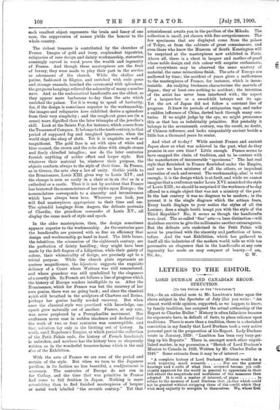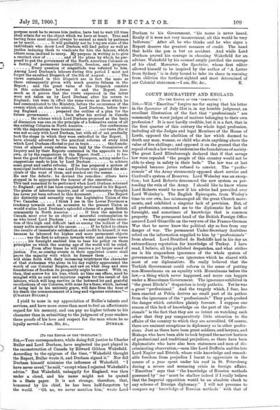LETTERS TO THE EDITOR.
LORD DURHAM AND CANADIAN RECON- STRUCTION.
(TO THE EDITOR OF THE " SPECTATOR.1
SIR,—In an editorial note to Mr. Lambton's letter upon the above subject in the Spectator of July 21st you write : "An
almost world-wide opinion, supported, as we- happen to know, by family tradition, has assigned the actual authorship of the Report to Charles Buller." History is often fallacious because its exponents have, in default of facts, to place reliance upon traditions. There is more than a tradition, there is a cherished conviction in my family that Lord Durham took a very active personal part in the preparation of his Report. Lady Durham wrote in January, 1839: " Lambton has been very busy get-
ting up his Reports." There is, amongst much other unpub- lished matter, in my possession a "Sketch of Lord Durham's Mission to Canada in 1838, Written by Mr. Charles Buller in 1840." Some extracts from it may be of interest :—
"A complete history of Lord Durham's Mission would be a work requiring much research Nor are, the general . bearings and r. suits of what than occurred become yot suffi- ciently apparent for the world in general to appreciate in their full extent the magnitude and usefulness of the measures then adopted It is still a matter of interest, of pique to refuse to the memory of Lord Durham that justice which could not be granted without stripping them of the credit which they wish most unjustly to arrogate to themselves. We, whose first • purpose must be to secure him justice, have but to wait till time shall attain for us the object which we have at heart. True and lasting fame must almost always be earned as much by patience as by merit. . . . . • It will probably not be long ere some of the individuals who decry Lord Durham will find policy as well as justice inducing them to vindicate for him the honour, which others seem inclined to usurp. My purpose in writing is to give a succinct view of and of the plane by which he pur- posed to put the government of the North American Colonies on a footing of permanent tranquillity, freedom, and progress.
Every question of magnitude was referred to him. Among Lord Durham's labours during this period I must not forget the excellent Dispatch of the 9th of August The views contained in this Dispatch are in fact the same as those subsequently given with much greater fulness in the Report ; and the great value of the Dispatch consists in this coincidence between it and the Report, inas- much as it proves that the views expressed in the latter were not taken up by Lord Durham after his return to England; but were in effect the same views as those which he had communicated to the Ministry, before the occurrence of the events which cut short his mission. Lord Durham, before leav-
ing England prepared the outline of a plan for the
future government Soon after his arrival in Canada the scheme which Lord Durham proposed as the basis of discussion was one on the principle of a federative union of all the existing Colonies in North America Our conferences with the deputations were harmonious our views (for it
was not so only with Lord Durham, but with all of us) gradually took the shape in which they were embodied in the Report. I have already adverted to the practical reforms of every kind which Lord Durham effected or put in train . . . . . the founda- tions of almost every reform were laid by the Commission of Inquiry and by their Reports contained in the appendix to his
own, or by the suggestions in the Report itself It has been the good fortune of Mr. Poulett Thompson, acting under tha suggestions made to him by Lord Durham to achieve some great and useful reforms. If he has prepared a system of municipal institutions.it was Lord Durham who painted the mis- chiefs of the want of them, and marked out the means He saw the defects : he devised the remedies : others have stepped in to appropriate the honour of the execution This task remained to be performed when Lord Durham returned to England: and it has been completely performed in his Report. The praise of laborious inquiry, and of comprehensive thought has never yet been refused to this document The Report did distinctly and earnestly urge the Legislative Union of the
Two Canadas I think I see in the Lower Provinces a tendency towards such an accession to the present Union as would realise Lord Durham's splendid scheme of a great British community in North America If then the mission to Canada must ever be an object of mournful contemplation to us who loved Lord Durham we may regard the execu- tion of this high and difficult task as among the noblest of the
many noble memorials of his career If he failed to obtain the results of immediate satisfaction and credit to himself, it was because he laboured for higher and more permanent objects was the first to advance towards wider and clearer views . his foresight enabled him to base his policy on those principles on which the coming age of the world will be ruled. From after times he will receive a yet larger meed of justice. For, as coming events in their appointed course shall
prove the sagacity with which he foresaw them SO will shine forth with daily increasing brightness the character of that statesman who alone in his day rightly appreciated the worth of our Colonial Empire, and saw on what deep and sure foundations of freedom its prosperity might be reared. With us, then, that sorrow for his loss, which no time can efface, need be mingled with no vain and injurious regrets for the result of his labours, which will long survive in the bettered lot and grateful recollections of our Colonies, with none for a fame, which, instead of being laid in his untimely grave, will date from the hour of his death the commencement of .a long and vigorous existence."— (CHARLES BULLER.)
I yield to none in my appreciation of Buller's talents and services, and have more cause than most to feel an affectionate regard for his memory, and can pay no higher tribute to his character than in submitting to the judgment of your readers these proofs of his love and respect for the man whom he so
loyally served.—I am, Sir, &c., DURHAM.



































 Previous page
Previous page